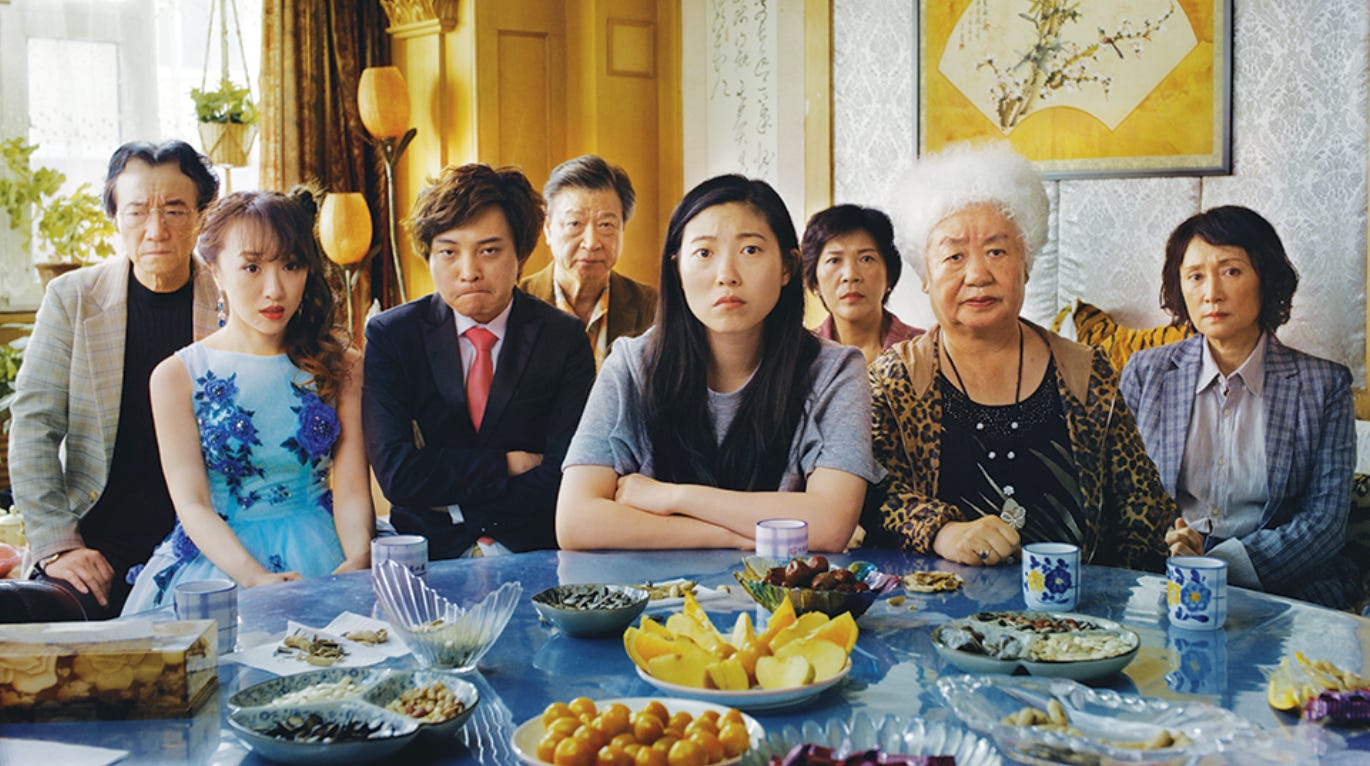Minari, The Farewell & Kim's Convenience: What you should be watching
This weekend I binged 2020 Oscar contender "Minari," 2019 Oscar snub, "The Farewell" and a few episodes of "Kim's Convenience"
Minari: Like Nomadland, Minari is a “small” movie comprised of important truths, with stories unfolding thru characters whose interactions with one another showcase exquisitely nuanced micro-movements, seemingly insignificant on their own, but taken together underscore the artistry of the directors’ intent.
In “Minari,” Lee Isaac Chung uses the backdrop of an unlikely and unassuming hillbilly Ozarks of Arkansas in the 1980s as the centerpiece of the American Dream for the Yi family.
Jacob and Monica, husband and wife, are chick sexers by day (yes this is an actual thing and you use the chick’s vent to determine if it’s a male or female). Jacob, an expert sexer yearns for the fulfillment of being more for himself and his family. By buying a trailer on 20 acres of farmland, he sees a future of opportunity. Monica, his practical wife who is from the city, sees no water, no church, no social outlet, and the hardships of a make it or break it future with Jacob. The two of them are at odds. Their kids are their universe but the youngest, a spitfire and at times, grade-A jerk, named David has a heart murmur and Monica worries for him and distance from the hospital with this move to the Ozark, as does his older sister, Anne.
Without giving too much away, Grandma Soonja enters the picture (from Korea) to help the family out and soon proves to be quite the match for David, at times adversarial based on David’s estimation, but she’s probably the one person in the film who truly sees him and over time, David sees this as well.
I’m not going to give you all the reasons to see the movie, but enough to say that the movie’s focus is on this particular family (their struggles and triumphs), but it’s also an immigrant experience story. In this case, the family is Korean and so the story centers on that unique cultural perspective. America, lest we forget, is a country of people that are either immigrants themselves or people that came from immigrant stock. Appreciating that is to understand and relate to how it feels to be the outsider and remember that at all times.
On a lighter note, if the thought of seeing Steven Yuen again on TV doesn’t get you there (we miss you Glenn!), then the fact this film has collected a ton of acclaim and awards already this season should be worth something. It’s worth all of the accolades and then some.
Notable Mentions:
David, to his grandma Soonja, “How does pee taste?” (you have to watch it to get this line)
Anne, to her grandma Soonja, “It’s called Mountain Dew. It’s water from the mountains.”
Pentecostal Paul in every scene with Jacob. Jacob’s reaction = priceless
Monica asking another Korean hatchery sexer about why they don’t start their own Korean church, “There’s a reason these Koreans left the cities…”
Steven Yuen’s impressive command of Korean language. For those naysayers who balked at this film being nominated as a Foreign Film, one word to say to you. Seriously??? Ok, but yes agreed it’s an Amercian Experience film. Still 95% of it is in Korean.
Stream for $$:
The Farewell on Amazon Prime
Nora Lum, known by her stage name, Awkwafina, is formidable as Billi in The Farewell. Like the Yi family in Minari, Billi is struggling with her East-West identity and how to reconcile both parts of self - the one that wants to be open and free with her pain and the one that feels honesty is the best course of action with the Chinese part that says, “take this one for the team” and accept that you are one small piece of the equation. Because you see, this movie is all about preparing for death. For Billi, it’s preparing for the death of her beloved, Nai Nai (grandma).
Billi moved from China with her parents to the U.S. (NYC) when she was young and she speaks fluent Chinese. Her family is mostly in China. She has very few memories of her early childhood that don’t involve her Nai Nai.
After telling Billi about her Nai Nai’s impending death, Billi’s parents tell her that they don’t want her to come back to China with them. They explain that of everyone, she is the least capable of not showing her emotions and they are all operating under the deceptive guise of Billi’s cousin’s wedding ruse for the real reason of their return, when in fact the wedding is just a means for everyone to come to town and not arouse suspicion.
As the movie progresses, each of its characters, beyond Billi, who serves as the movie’s strength, its soul and emotional center, is visibly struggling with the family’s decision/their duty to carry the emotional burden of Nai Nai’s death upon themselves and not tell Nai Nai. As Jian, Billi’s mom explains, the Chinese believe it is not the cancer that kills but the fear of the cancer. Even so, Billi’s uncle and Nai Nai’s son, starts to fall apart on the stage during his son’s wedding reception as he fondly celebrates his mother.
This movie was snubbed at last year’s Oscars and it’s a shame.
Beyond the motif of the East-West and immigrant duality in identity, there’s the really important and worthwhile fundamental question here of how should the living prepare for a loved one’s death. What do we take it upon ourselves? How do we bear the pain? Is it ours to bear alone? Are we robbing the dying of living by not telling them?
Kim’s Convenience on Netflix. One word. Funny.
Takes place in Toronto, Canada. The same country of origin that brought the world the comedic heights of Schitt’s Creek. Tells the story of a the Kim family whose dad owns a convenience store. The film also deals with the immigrant experience. This time in urban Canada.
Go watch it. Now.







